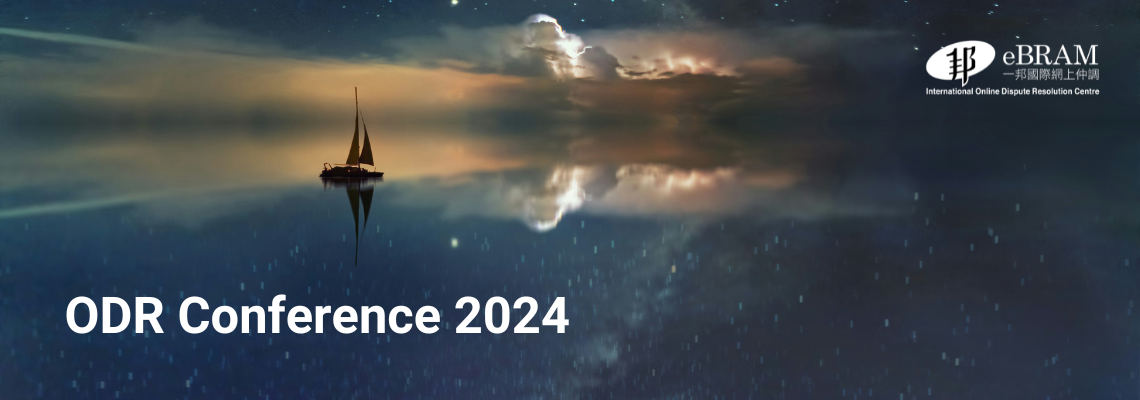即將舉行的活動
Navigating through maelstroms – aboard ODR (僅供英文版)
3 May 2024
Click HERE to register.
Date: May 3, 2024 (Friday)
Time: 1:30pm - 5:00pm
Venue: Niccolo Room, Murray Hotel, 22 Cotton Tree Drive, Central, Hong Kong
Description:
Dispute resolution can be convoluted, complicated and confusing. As we try to sail through stormy disputes, Online Dispute Resolution (ODR) could be a lifeboat, but being onboard with ODR can be an unfamiliar experience. In eBRAM’s inaugural ODR Conference, we invite you to explore with us two key questions:
(A) does the use of ODR help or harm the bottom line for legal practice and business; and
(B) how far can AI technology be applied to arbitral award drafting and during the mediation process and still be regarded as acceptable, if at all?
Join us as we set sail to chart new courses in ODR!
Language of the Conference: English
About eBRAM
eBRAM is an arbitration and mediation institution combined with Online Dispute Resolution (ODR) and LawTech facilities. Our objective in providing this integrated service is to leverage new technologies to make dispute resolution more accessible to disputants. Our ODR facilities are designed to reduce the overhead in the management of cases and the friction caused by traditional administrative procedures. We hope that this frees disputants to put more of their focus on resolving their actual disputes, rather than spending energy disputing over the technical aspects of how to run their case.
eBRAM is one of seven qualified institutions under the Arrangement Concerning Mutual Assistance in Court-ordered Interim Measures in Aid of Arbitral Proceedings by the Courts of the Mainland and the Hong Kong Special Administrative Region. eBRAM is also one of five listed ODR Providers worldwide under the APEC Collaborative Framework for ODR of Cross-Border B2B Disputes.
In 2023, eBRAM expanded beyond providing ODR services through launching the Deal-making Portal (DMP), an online tool that facilitates cross-border transactions by using technology to help enterprises to identify and collaborate with potential business partners.
eBRAM provides a one-stop service for enterprises from the start of their cross-border transactions to contract completion, and to dispute resolution if and when disputes arise.
Program:
|
1:15 – 1:30pm |
Registration |
|
1:30 – 1:40pm |
Conference kick-off |
|
1:40 – 1:45 pm |
Opening Address |
|
1:45 – 1:50pm |
Welcome Remarks
|
|
1:50 – 2:00pm |
Keynote Speech |
|
2:00 – 2:50pm |
Panel – Impact of ODR efficiencies on the value of legal practitioners and revenue of law firm. ODR consists of a set of tools designed to streamline arbitral, mediation and generally dispute resolution processes. The objective of ODR is to provide greater cost and time efficiency. No one doubts the importance of reducing monetary and time costs, and many jurisdictions have even undergone legal reforms that encourage traditionally slower and more costly litigation to be more efficient. Introducing technology that can satisfy these requirements is one part of the equation, but another important factor to actual implementation of faster processes lies in the economics of running a legal business. Efficiency could mean fewer billable hours. This panel will discuss the tensions underlying the efficiencies afforded by the use of ODR and the realities of maintaining a successful legal business. It will also explore the potential of aligning business interests with efficiency. Moderator:
Speakers:
|
|
2:50 – 3:00pm |
Coffee Break |
|
3:00 – 3:10pm |
Sharing – Exploring the potential uses of generative AI for ODR Generative AI is one type of AI (one which in the past year has dominated headlines) which continues to hold immense promise for the future. Generative AI is especially good at summarising information, synthesising data and subsequently generating useful content. In discovering its potential application in the context of ODR, generative AI could assist in dramatically speeding up the drafting of legal documents or the generation of personalised settlement proposals. In this session, Ms Sharyn Chang will share generative AI solutions geared specifically towards the legal industry.
|
|
3:10 – 4:05pm |
Debate – AI should be used in drafting arbitral awards and in mediation AI can significantly enhance efficiency by automating tasks like summarising legal authorities, collating evidence so that the factual matrix can be interrogated, drafting of legal documents and even portions of arbitral awards. On the other hand, to what extent can the dispute resolution community, the legal industry and the wider world accept either AI-made decisions, or AI-assisted decisions, or not at all? What about allowing AI to assist with non-determinative parts of the arbitral award? And is it acceptable to use AI for generating prompts and potential settlement solutions for mediators? What about transparency, fairness, and accountability? Current ODR processes emphasise the human-element in the determinative process, but as both AI and ODR technologies evolve, striking the right balance between AI’s potential benefits and safeguarding legal rights and the sanctity of the dispute resolution process become critical. Hear this debate and see where we can draw the line. Adjudicators: For: Against: |
|
4:05 – 4:15pm |
Closing Remarks |
|
4:15 – 5:00pm |
Cocktail Reception |

